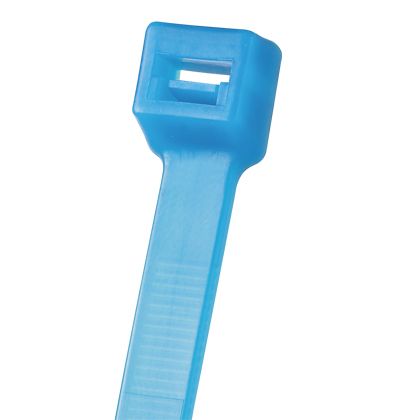Cable Ties are essential tools for organizing and securing wires, cables, and objects across industries. Among the most common options are Tefzel and nylon cable ties, each with unique properties that make them suitable for specific applications.
Understanding the differences between these two types of cable ties ensures you select the right one for your needs.
This article compares Tefzel and nylon cable ties, highlighting their strengths, weaknesses, and ideal uses with practical examples.
What Are Tefzel and Nylon Cable Ties?
Tefzel Cable Ties
Tefzel cable ties are made from Ethylene Tetrafluoroethylene (ETFE), a high-performance thermoplastic. Known for their chemical resistance, UV stability, and extreme temperature tolerance, Tefzel ties are designed for demanding environments like aerospace, chemical processing, and nuclear plants.
Learn more: What Is a Tefzel Cable Tie and What Can You Use It For?
Nylon Cable Ties
Nylon cable ties are the most common type, made from Nylon 6/6. They are versatile, lightweight, and cost-effective, making them ideal for general-purpose applications.
Nylon ties perform well indoors and in moderate outdoor conditions but may degrade when exposed to extreme temperatures, chemicals, or UV light.
Learn more: Here's How to Distinguish the Quality of Nylon Cable Ties
Key Differences Between Tefzel and Nylon Cable Ties

Material and Durability
Tefzel cable ties resist chemicals, UV rays, and high temperatures, making them ideal for harsh environments. Nylon ties, while strong and flexible, are less resistant to UV exposure and extreme conditions, making them better for indoor or short-term outdoor use.
Temperature Tolerance
Tefzel ties operate effectively in temperatures from -40°F to 338°F, making them suitable for high-heat or freezing environments. Nylon ties typically tolerate temperatures from -40°F to 185°F, which is sufficient for most general applications but not for extreme conditions.
Chemical Resistance
Tefzel cable ties excel in resisting acids, solvents, and corrosive substances, often used in chemical plants or industrial facilities. Nylon ties have limited chemical resistance and can weaken or degrade when exposed to harsh chemicals.
UV Resistance
Tefzel cable ties offer excellent UV resistance, making them perfect for prolonged outdoor use. While UV-stabilized nylon ties are available, standard nylon ties degrade quickly under sunlight.
Cost
Tefzel cable ties are more expensive due to their specialized properties. Nylon ties are affordable and widely available, making them suitable for budget-conscious projects.
Specific Uses and Examples
When to Use Tefzel Cable Ties
Tefzel cable ties are ideal for high-stakes applications. In aerospace, they secure cables in aircraft where extreme temperature fluctuations, vibrations, and chemical exposure are common.
Chemical processing plants rely on Tefzel ties to fasten tubing and wiring exposed to corrosive substances. Marine environments also benefit from Tefzel ties, which resist saltwater corrosion and UV exposure, making them suitable for securing equipment on boats or docks.
In nuclear facilities, they bundle components in areas exposed to radiation and high temperatures, ensuring safety and reliability.
When to Use Nylon Cable Ties
Nylon cable ties work well for everyday applications. In homes and offices, they bundle electrical cables and cords indoors, such as organizing desk wires. Automotive repairs also benefit from nylon ties to secure wiring in vehicles where temperatures remain moderate.
For temporary outdoor uses, nylon ties provide a cost-effective solution for short-term fastening, such as holding up holiday decorations. DIY enthusiasts frequently use them for quick and affordable lightweight bundling tasks, such as securing garden tools.
Key Considerations When Choosing Between Tefzel and Nylon

Consider the environment when choosing cable ties. For harsh, outdoor, or chemical-heavy environments, opt for Tefzel. Nylon cable ties are a better choice for indoor or low-stress conditions.
Budget plays a significant role, as nylon ties are more affordable, while Tefzel ties offer superior performance in demanding applications.
For long-term installations, Tefzel ties provide durability and reliability, while nylon ties are sufficient for temporary or everyday use. Both types offer high tensile strength, but Tefzel ties often handle more demanding loads due to their durability.
Practical Applications of Tefzel and Nylon Cable Ties
In industrial settings, Tefzel ties are commonly used in chemical manufacturing plants, nuclear facilities, or oil refineries. Nylon ties are better suited for warehouses or factories with controlled environments.
For outdoor installations, Tefzel ties secure solar panel cables in sunny, hot regions, while nylon ties work well for temporary fastening, such as garden lights.
Everyday uses highlight the versatility of nylon ties for organizing home electronics or securing decorations indoors. Tefzel ties, however, excel in long-term outdoor applications exposed to extreme weather.
Conclusion
Tefzel and nylon cable ties each excel in specific environments. Tefzel ties dominate in high-stakes applications where resistance to chemicals, UV light, and extreme temperatures is crucial. Nylon ties, on the other hand, provide a cost-effective and versatile solution for everyday and indoor tasks. By understanding the strengths and limitations of both, you can confidently select the right cable tie for your project.
Whether securing wires in a jet engine or tidying up your home office, the right choice ensures durability, reliability, and peace of mind.
For more insights and tips on zip ties and other related products, explore cabletiesunlimited.com and follow us on our social media communities on Facebook and Instagram!

